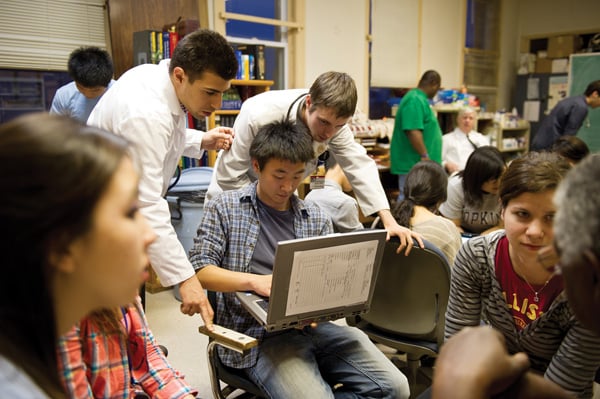On a chilly spring evening, soon after a hailstorm, Donald Ross picks his way up a flight of stairs, on crutches, at the Baltimore Rescue Mission Medical Clinic. Tonight his hip aches. Like many homeless people in the area, Ross has relied on this free clinic, founded by the late Martin L. Singewald ’30, MD ’38, and now operated by John S. Dalton II, for his routine medical care.
Once up three flights of stairs, Ross is met by the bustle of Johns Hopkins volunteers-medical students and undergrads-who work Wednesday evenings helping Dalton through a heavy caseload. Henry Ma ’12, a biomedical engineering major who has been volunteering here since his freshman year, greets Ross warmly.
Armed with a donated laptop computer, and access to a secure, private computer database developed by a Johns Hopkins professor, medical students, and alumni, Ma quickly calls up the patient’s complete medical history. With a few keystrokes, he sees that Ross has visited the clinic numerous times since November. The pain is not improving. Dalton wants to send Ross to a hospital for a hip X-ray. But the man needs help filling out the paperwork. “I’m worried he may have a dislocated hip,” says Ma, as he works on a lengthy medical questionnaire.
This instant access to secure, private electronic medical records (EMRs) is new for the Baltimore Rescue Mission, and it is extremely rare among Baltimore’s underserved populations. But this pilot project, pioneered by Johns Hopkins and University of Maryland medical students, called Networking Health, is attracting attention for its potential to level the playing field for care among the city’s most vulnerable residents.

As the nation grapples with the growing use of electronic medical records and a patchwork of health care systems, the homeless present a unique challenge. Many are overwhelmed with concerns about daily food and shelter. Their health care is sporadic, and they often present to emergency rooms with neglected or advanced disease-and inaccessible or incomplete medical records.
“Without access to their own medical records, there is no way these individuals can receive an equal standard of care,” says Eugene Semenov ’07, founder of the nonprofit Networking Health, who is now in his third year of medical school at Johns Hopkins.
Semenov, and partners who include Michael A. Morris, A&S ’07, A&S MS ’08, now in medical school at the University of Maryland, presented information about the nonprofit this spring at the fifth annual Clinton Global Initiative Conference, an event established by President Bill Clinton to showcase global, innovative ideas aimed at uplifting humanity. Semenov and Morris, friends as undergrads, founded Networking Health in 2011 after securing an Albert Schweitzer Fellowship.
The pair was referred to Avi Rubin, a professor of computer science and director of the Whiting School’s Health and Medical Security Lab, for guidance on how to make the EMRs secure. “We’ve done research on encryption technology,” says Rubin, “and we are trying to integrate this into their custom-designed software system.” Rubin’s lab now is working on a secure Web-based portal with authentication that could enable homeless residents to securely log into their own medical histories.
“The idea is to allow patients to view their medical records much like people can access banking information,” he says.
Another lofty goal is to join Maryland’s CRISP Regional Extension Center, a nonprofit cooperative established to create a health information exchange among physicians, hospitals, laboratories, and other facilities. In theory, for example, Ross’ records would be available when he shows up for his X-ray.
But for now, that reality is many steps away. On this night, minutes before the mandatory 9 pm clinic closing, Ma finishes up the paperwork for Ross, who promises to follow through with the X-ray. Homeless, and on crutches, he’ll take a free bus to a nearby hospital. Ross turns to Ma: “Hey, thank you, man.” And Ma replies: “No problem.”




